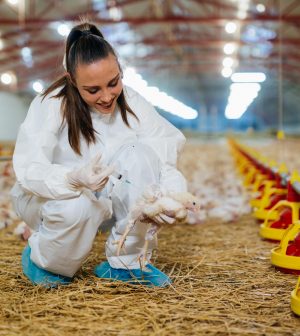- The Long-Term Effects of Daily Turmeric Supplements on Liver Health
- Could Your Grocery Store Meat Be Causing Recurring UTIs?
- Are You Making This Expensive Thermostat Error This Winter?
- Recognizing the Signs of Hypothyroidism
- 10 Strategies to Overcome Insomnia
- Could Artificial Sweeteners Be Aging the Brain Faster?
- Techniques for Soothing Your Nervous System
- Does the Water in Your House Smell Funny? Here’s Why
- Can a Daily Dose of Apple Cider Vinegar Actually Aid Weight Loss?
- 6 Health Beverages That Can Actually Spike Your Blood Sugar
U.S. To Test Vaccines in Poultry as Way to Curb Bird Flu Outbreak

FRIDAY, Feb. 10, 2023 (HealthDay News) – U.S. health officials are considering using vaccines in poultry to stem an ongoing outbreak of bird flu.
Scientists will begin testing the first vaccines for birds in years as the spread of avian influenza has killed about 58 million birds, according to the U.S. Department of Agriculture’s Animal and Plant Health Inspection Service.
While the outbreak has devastated both wild and commercial bird flocks, many of the dead animals are commercially raised poultry.
Nearly every state – 47 of 50 – has spotted the virus in poultry, and all have found it spreading in wild birds.
The issue is not simple because there are concerns that vaccinating commercial birds may make it harder to export American poultry products, CBS News reported.
“What is the trigger point of when you might use vaccination? And that’s what they’re looking at. Is it so many birds in a poultry farms in an area getting infected? Or is it a certain amount of economic loss? Or is it because a neighboring state has the virus in poultry, and you’re concerned? So there’s those are really the tough, tough questions,” poultry veterinarian Dr. David Swayne told CBS News.
Shots have been licensed in past outbreaks and poultry are already vaccinated for disease like infectious bronchitis. USDA spokesman Mike Stepien said the process to license vaccines may be able to be accelerated for emergencies.
“The decision to proceed with vaccination is complex, and many factors must be considered before implementing a vaccination strategy,” Stepien told CBS News, adding that the inspection service is discussing its options and “soliciting input from many different industry stakeholders that would be impacted.”
Whether vaccines would work against the current strain of bird flu isn’t certain.
“There are a lot of moving parts to this kind of testing. And some of it is just pure logistics of getting everything in place to do the testing, getting the vaccines that are updated, getting things from parties that are involved, different manufacturers,” Erin Spackman, a virologist who studies avian influenza vaccines at the USDA, told CBS News.
The vaccine trials will offer independent evaluation about how well the vaccine works. Evaluating the vaccines may take three months, Spackman said.
Another option is known as Differentiating Infected from Vaccinated (DIVA). These strategies could include aggressively testing birds who die in a flock to see if the virus was the cause, sampling live birds for antibody testing or testing drinking water containers.
“We want to make sure our partners understand that, if we use them, we’re going to use them in the right manner so that they can feel secure and safe that the products they buy are not products that might contain, say, a highly pathogenic avian influenza virus,” Swayne said.
The virus poses little threat to humans, according to officials, though it has had a 56% fatality rate in the small number of people who were in contact with infected birds and then tested positive, according to the World Health Organization (WHO).
Only one of 6,000 American poultry workers in contact with infected birds has tested positive, CBS News reported.
The U.S. Centers for Disease Control and Prevention noted there has been transmission to other mammals, mainly predators. The United States also maintains a program with vaccine makers to test small quantities of shots for humans, if needed. CDC Director Dr. Rochelle Walensky told advisors last week the issue was high on her radar, CBS News reported.
Americans should not handle sick or dead birds, CDC officials advised.
More information
The U.S. Centers for Disease Control and Prevention has more on bird flu.
SOURCE: CBS News
Source: HealthDay
Copyright © 2026 HealthDay. All rights reserved.










